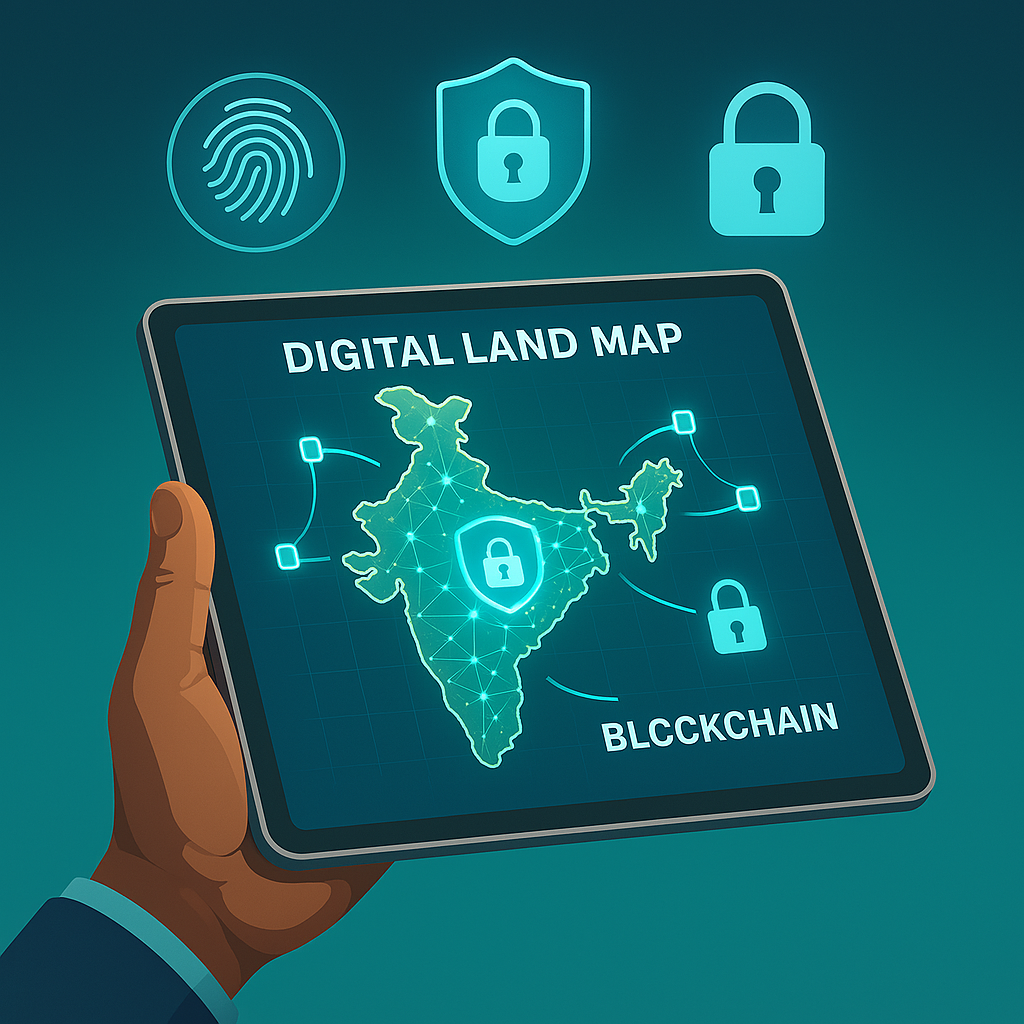Land ownership in India is often a source of major conflict, confusion, and corruption. Despite rapid digital advancements in other sectors, land governance remains stuck in a web of bureaucracy, paper-based processes, and opacity. Land disputes account for a significant portion of civil litigation in Indian courts, with millions of cases pending for years. But what if a single, transparent, tamper-proof technology could bring order to this chaos? Blockchain might just be that solution.
This blog explores the persistent land issues in India and how blockchain technology could revolutionize the way land records are managed, potentially eliminating corruption, increasing transparency, and empowering rightful landowners.
Land Ownership in India: A Tangled Web
1.1 Legacy Systems and Colonial Hangovers India’s land record system dates back to British colonial rule. Much of the documentation is outdated, incomplete, and often lost. Manual entries, multiple copies, and inconsistent maintenance continue to plague record-keeping.
1.2 Disparate Systems Across States India has no uniform national land record system. Instead, each state maintains its own records in different formats and under varied authorities. This fragmentation makes it difficult to verify ownership.
1.3 Major Challenges
- Title Uncertainty: Land titles in India do not confer ownership. They merely act as a record of possession.
- Fraud and Forgery: Duplicate documents, forged signatures, and illegal sales are common.
- Land Grabs and Encroachments: Politically connected individuals often manipulate records to claim land illegally.
- Inefficiencies in Land Transactions: Buying or selling land involves a complex, multi-step verification process.
- Disputes and Litigations: According to a NITI Aayog report, over 66% of civil cases in India are land-related.
The Need for Reform: Why Change is Urgent
2.1 Economic Impact Lack of clear land titles restricts access to credit, affects urban planning, and delays infrastructure development. It also increases the cost and time of doing business.
2.2 Social Justice and Rural Development Marginalized communities, particularly Dalits and tribal groups, often lose land due to bureaucratic negligence or fraud. Ensuring rightful ownership is key to social equity.
2.3 Government Initiatives and Limitations Efforts like the Digital India Land Records Modernization Programme (DILRMP) aim to digitize records, but they are limited by outdated data, non-standard formats, and lack of trust.
Enter Blockchain: A New Hope

3.1 What is Blockchain? Blockchain is a distributed ledger technology that records transactions in a secure, tamper-proof, and transparent way. Each block contains data, a timestamp, and a cryptographic hash of the previous block, making it immutable.
3.2 Key Features Relevant to Land Records
- Decentralization: No single authority controls the system, reducing corruption.
- Immutability: Once data is recorded, it cannot be altered.
- Transparency: Publicly accessible records enable trust.
- Smart Contracts: Automated transactions can occur once certain conditions are met, reducing the need for intermediaries.
Blockchain for Land Records: How It Works
4.1 Tokenization of Land Parcels Each land parcel can be represented as a unique digital token, linked to a verified owner. Ownership transfers can be handled via smart contracts.
4.2 Workflow for Blockchain-based Land Management
- Data Collection: Survey and digitize land data using GPS, drones, and satellite imagery.
- Data Validation: Collaborate with local authorities and stakeholders to verify historical ownership.
- Blockchain Integration: Upload verified data onto a secure, distributed blockchain ledger.
- Public Access and Verification: Allow anyone to verify land ownership online.
- Smart Transfers: Automate land transactions using smart contracts.
4.3 Real-time Monitoring and Audits Blockchain enables real-time tracking of land records and ownership changes, helping prevent illegal alterations and identify anomalies instantly.
Success Stories and Use Cases
5.1 Andhra Pradesh and Telangana, India Both states piloted blockchain land record projects in partnership with companies like ChromaWay and Zebi. The pilots demonstrated reduced manipulation and faster transactions.
5.2 Sweden and Georgia Sweden’s Lantmäteriet and Georgia’s National Agency of Public Registry have implemented blockchain in land titling with success, reducing fraud and administrative overhead.
5.3 Ghana and Rwanda These African nations have used blockchain to secure land rights for rural communities, proving its viability in low-infrastructure regions.
Challenges and Considerations
6.1 Technical Barriers
- High initial cost for digital infrastructure
- Need for skilled workforce
6.2 Legal and Regulatory Hurdles
- Blockchain-based records must be legally recognized
- Coordination between multiple departments is essential
6.3 Privacy and Security
- Sensitive data must be encrypted
- Public blockchains may expose personal information
6.4 Adoption and Public Trust Building trust among citizens, especially in rural areas, requires awareness campaigns and capacity-building efforts.
The Road Ahead: Policy Recommendations
7.1 National Blockchain Land Registry Framework Develop a unified, interoperable framework that all states can adopt.
7.2 Legal Reforms Update the Indian Registration Act and Transfer of Property Act to recognize blockchain-based titles.
7.3 Public-Private Partnerships (PPPs) Encourage innovation by involving blockchain startups and tech companies.
7.4 Pilot Projects and Scaling Start with small, high-conflict regions to prove the model, then scale nationwide.
7.5 Integrate with Aadhaar and GIS Use Aadhaar for identity verification and GIS for accurate land mapping.
Conclusion
Land is more than just real estate in India; it represents livelihood, identity, and social status. Yet, it remains entangled in a legacy of corruption, disputes, and inefficiency. Blockchain offers a groundbreaking opportunity to transform land governance by bringing in trust, transparency, and technology. While challenges remain, the path forward is clear: India must embrace blockchain not as a futuristic idea but as a present-day necessity for justice, equity, and growth.
The success of such transformation depends on political will, legal reforms, and the collective push by technologists, policymakers, and civil society. If done right, blockchain could mark the beginning of a new chapter in India’s land history—one defined by clarity, not conflict.









+ There are no comments
Add yours